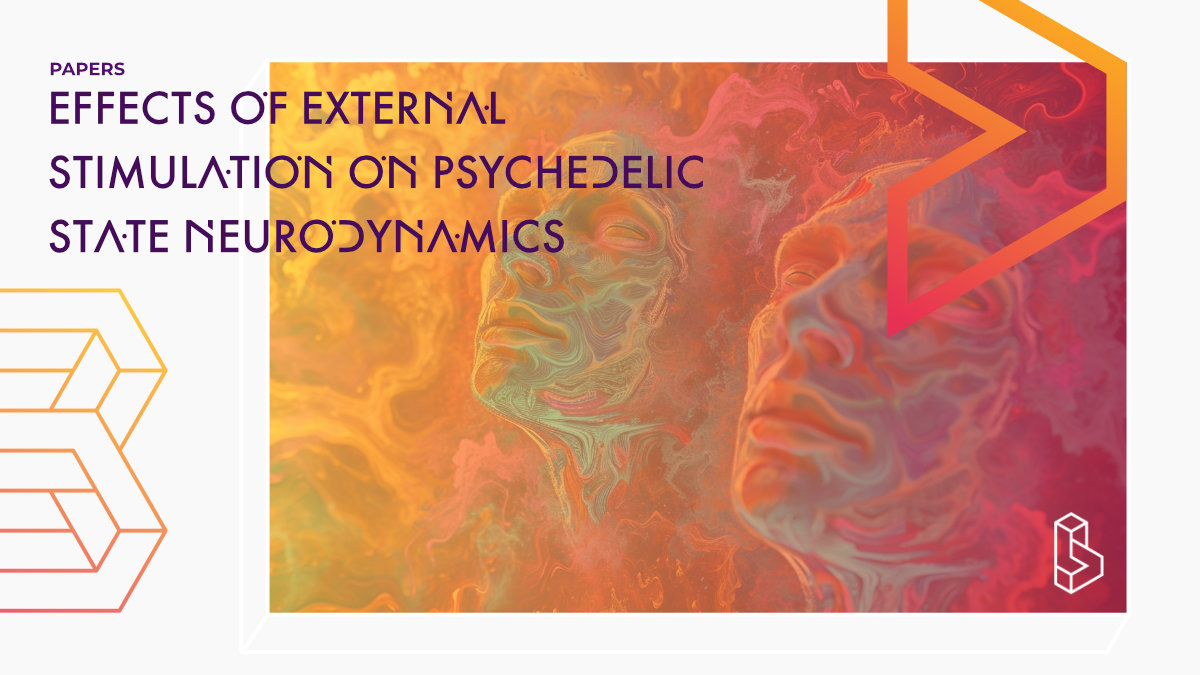This further analysis of data from a single-blind, placebo-controlled study (n=20) on the effects of LSD (75µg) finds that the context (eyes closed/open, silence/music/video) modulates the level of brain entropy. The study finds that eyes-closed elicited the biggest response, and that video (external stimuli) disrupts the correlation between brain entropy and subjective ratings of the experience.
Abstract of Effects of external stimulation on psychedelic state neurodynamics
“Recent findings have shown that psychedelics reliably enhance brain entropy (understood as neural signal diversity), and this effect has been associated with both acute and long-term psychological outcomes, such as personality changes. These findings are particularly intriguing, given that a decrease of brain entropy is a robust indicator of loss of consciousness (e.g., from wakefulness to sleep). However, little is known about how context impacts the entropy-enhancing effect of psychedelics, which carries important implications for how it can be exploited in, for example, psychedelic psychotherapy. This article investigates how brain entropy is modulated by stimulus manipulation during a psychedelic experience by studying participants under the effects of lysergic acid diethylamide (LSD) or placebo, either with gross state changes (eyes closed vs open) or different stimuli (no stimulus vs music vs video). Results show that while brain entropy increases with LSD under all of the experimental conditions, it exhibits the largest changes when subjects have their eyes closed. Furthermore, brain entropy changes are consistently associated with subjective ratings of the psychedelic experience, but this relationship is disrupted when participants are viewing a video─potentially due to a “competition” between external stimuli and endogenous LSD-induced imagery. Taken together, our findings provide strong quantitative evidence of the role of context in modulating neural dynamics during a psychedelic experience, underlining the importance of performing psychedelic psychotherapy in a suitable environment.”
Authors: Pedro A.M. Mediano, Fernando E. Rosas, Christopher Timmermann, Leor Roseman, David J. Nutt, Amanda Feilding, Mendel Kaelen, Morten L. Kringelbach, Adam B. Barrett, Anil K. Seth, Suresh Muthukumaraswamy, Daniel Bor, Robin L. Carhart-Harris
Notes
The participants (data) from this study are from Carhart-Harris et al. (2016), which looked at the neural correlates of the LSD experience with fMRI.
Summary of Effects of external stimulation on psychedelic state neurodynamics
Recent findings have shown that psychedelics increase brain entropy, and that this effect is associated with both acute and long-term psychological outcomes. However, little is known about how context impacts the entropy-enhancing effect of psychedelics, which has important implications for how it can be exploited in psychedelic psychotherapy.
Psychedelic substances such as LSD and psilocybin induce profound changes in subjects’ perception, cognition, and conscious experience, and are used therapeutically to treat multiple mental health conditions. However, the mechanisms associated with their therapeutic efficacy are not yet completely understood.
Find this paper
Effects of external stimulation on psychedelic state neurodynamics
https://doi.org/10.1021/acschemneuro.3c00289
Open Access | Google Scholar | Backup | 🕊
Cite this paper (APA)
Mediano, P. A., Rosas, F. E., Timmermann, C., Roseman, L., Nutt, D. J., Feilding, A., ... & Carhart-Harris, R. L. (2024). Effects of External Stimulation on Psychedelic State Neurodynamics. ACS Chem. Neurosci.
Study details
Compounds studied
LSD
Topics studied
Healthy Subjects
Study characteristics
Original Re-analysis
Placebo-Controlled
Single-Blind
Within-Subject
Randomized
Participants
20
Humans
Compound Details
The psychedelics given at which dose and how many times
LSD 75 μg | 1x
